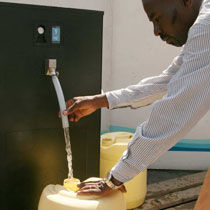With all the buzz about using cell phones in the field of development I decided to do a quick review of the different ways people have attempted to use cell phone technology to improve water sanitation and/or hygiene related access.
When we talk about cell phones for water and sanitation we are talking about a broad range of uses and technologies. On the simple end we can use basic cell phones to transmit data through sms (text messages) or voice. We can get more fancy and utilize smart phones that run more serious operating systems and have powerful features like internet connectivity, gps, and cameras. Here are some examples of how people have started using cell phones to improve WASH services in Africa and Asia:
1. Community Led Total Sanitation Tracking via SMS – In a World Bank WSP funded project in Indonesia, Health Officers and Sanitarians started using SMS to report on baseline conditions and progress on the path towards Open Defecation Free Communities. The officers text in the number of latrines contructed and other key information to a SMS server which processes the information and puts it into some sort of database. According to WSP they will plan to replicate this in 29 districts in the Province.
2. Q&A – IRC International Water and Sanitation Center piloted an SMS based Question and Answer service to link communities and individual users with information related to their water supply. Questions submitted via SMS are (or were) answered by one of the members a Water and Sanitation Network. Questions ranging from the costs of spare hand pump parts to inquiries about low pressure in a piped system in Dar es Salaam have been answered by this service. This pilot project started back in 2005 and I have not received any response by the operators whether they are still in action.
3. Water from Cell Phones – Grundfos, the Danish pump company, launched a new business model called LifeLink. LifeLink is a small water enterprise (see previous post on SWEs) that uses cell phones to transfer “water credits” from the user’s bank account to that of the pump operator. Lifelink constructs a solar powered water kiosk in a community and when someone wants to buy water they add credits to their account thorugh a simple text message transaction. The kiosk displays the users balance after they swipes some sort of pass. After that they are free to have as much water as they can afford.
4. Information Broadcasting – A number of programs throughout Africa and Asia have attempted to use SMS to broadcast information about everything from handwashing to water conservation.
These four cases are surely not comprehensive but give good examples of what people have used phones for in the WASH sector. I think we can break these uses down to the following:
- Monitoring and evaluation – Cell phones can be used to collect information and relay data back to some central location. This fucntionality can be extremly useful for tracking progress of work and maintaining transparency.
- Information Services (to end user) – People can get information by calling or texting a specified number (in addition to the example above check out google sms in Uganda).
- Gateway – The cell phone can act as a mechanism to enable a service (think about the Grundfos example above).
To date none of these projects have really gone to scale. As you could imagine there are some huge barriers to success including poor cell phone networks (including poor coverage and a lot of system downtime). I have a few ideas of my own on how to enhance WASH service delivery with cell phones and hope to post them in the coming weeks.
Any other interesting cell phone based projects? Post them in the comments section.


